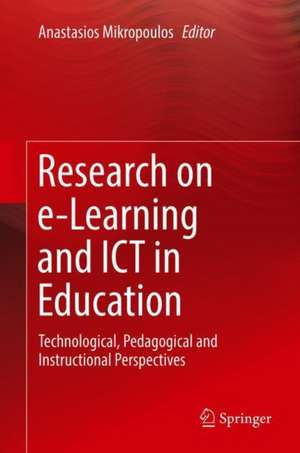Research on e-Learning and ICT in Education: Technological, Pedagogical and Instructional Perspectives
Editat de Tassos Anastasios Mikropoulosen Limba Engleză Hardback – 23 oct 2018
| Toate formatele și edițiile | Preț | Express |
|---|---|---|
| Paperback (1) | 646.62 lei 6-8 săpt. | |
| Springer International Publishing – feb 2019 | 646.62 lei 6-8 săpt. | |
| Hardback (1) | 653.00 lei 6-8 săpt. | |
| Springer International Publishing – 23 oct 2018 | 653.00 lei 6-8 săpt. |
Preț: 653.00 lei
Preț vechi: 768.23 lei
-15% Nou
Puncte Express: 980
Preț estimativ în valută:
124.95€ • 130.81$ • 103.39£
124.95€ • 130.81$ • 103.39£
Carte tipărită la comandă
Livrare economică 07-21 aprilie
Preluare comenzi: 021 569.72.76
Specificații
ISBN-13: 9783319950587
ISBN-10: 3319950584
Pagini: 372
Ilustrații: XIII, 407 p. 111 illus., 96 illus. in color.
Dimensiuni: 155 x 235 x 30 mm
Greutate: 0.77 kg
Ediția:1st ed. 2018
Editura: Springer International Publishing
Colecția Springer
Locul publicării:Cham, Switzerland
ISBN-10: 3319950584
Pagini: 372
Ilustrații: XIII, 407 p. 111 illus., 96 illus. in color.
Dimensiuni: 155 x 235 x 30 mm
Greutate: 0.77 kg
Ediția:1st ed. 2018
Editura: Springer International Publishing
Colecția Springer
Locul publicării:Cham, Switzerland
Cuprins
Part I: Digital Technologies and Pedagogy.- Chapter 1: The feasibility and interest of monitoring the cognitive and affective states of groups of co-learners in real time as they learn.- Chapter 2: Exploring the potential of computer-based concept mapping under self- and collaborative-mode within emerging learning environments.- Chapter 3: Creativity and ICT: theoretical approaches and perspectives in school education.- Chapter 4: Exploring teachers’ perceptions of Technological Pedagogical and Content Knowledge: Implications of a pilot study in Greece.- Chapter 5: An ensemble-based semi-supervised approach for predicting students’ performance.- Chapter 6: Addressing creativity in the collaborative design of digital books for Environmental and Math Education.- Chapter 7: How do transformational principals perceive ICT as a means for promoting 21st century skills? A descriptive case study.- Part II: Educational Games.- Chapter 8: The Educational Impacts of Minecraft on Elementary SchoolStudents.- Chapter 9: Mobile games in computer science education: State of the art and proposal of a mobile game design that incorporates physical activity.- Chapter 10: Exemplifying online game design and exploitation for interdisciplinary teaching in Primary School through the WeAreEurope game for EU citizenship education.- Chapter 11: Evaluation of an augmented reality game for environmental education: “Save Elli, Save the environment”.- Part III: Science and Mathematics.- Chapter 12: Hostage of the Software: Experiences Teaching Inferential Statistics to Undergraduate Human-Computer Interaction students and a Survey of the Literature.- Chapter 13: Examining Students Actions while Experimenting with a Blended Combination of Physical and Virtual Manipulatives in Physics.- Chapter 14: The impact of virtual laboratory environments in teaching-by-inquiry electric circuits in Greek Secondary Education: the ElectroLab Project.- Chapter 15: Tracing Students’ Actions in Inquiry-based Simulations.- Chapter 16: The use of ICT and the Realistic Mathematic Education for understanding simple and advanced stereometry shapes among University students.- Part IV: Robotics.- Chapter 17: Learning to program a humanoid robot: Impact on students in special education.- Chapter 18: E-ProBotLab: design and evaluation of an open educational robotics platform.- Part V: Higher Education.- Chapter 19: A software tool to evaluate performance in a higher education institution.- Chapter 20: Integration of technologies in higher education: Teachers’ needs and expectations at UTAD.- Chapter 21: Virtual environments for vocational training: immersion and user experience in a virtual kitchen.
Notă biografică
Anastasios Mikropoulos is a Professor in the Department of Primary Education at the University of Ioannina in Ioannina, Greece. His primary research interests include learning technologies, virtual reality in education, educational neuroscience, and digital educational games. He is the Director of the Educational Approaches to Virtual Reality Technologies Laboratory (EARTH Lab) at the University of Ioannina, which conducts basic and applied research in the scientific field of ICT in education, virtual reality in education, and the scientific and educational domains of educational software.
Textul de pe ultima copertă
This book is an essential text for researchers and academics seeking the most comprehensive and up-to-date coverage of all aspects of e-learning and ICT in education, providing expanded peer-reviewed content from research presented at the 10th Panhellenic Conference on ICT in Education. The volume includes papers covering technical, pedagogical, organizational, instructional, as well as policy aspects of ICT in Education and e-Learning, and emphasizes applied research relevant to the educational realities in schools, colleges, universities and informal learning organizations. Research on e-Learning and ICT in Education is a valuable resource for education professionals interested in keeping up with current trends, perspectives, and approaches determining e-Learning and ICT integration in practice, including learning and teaching, curriculum and instructional design, learning media and environments, teacher education and professional development.
Caracteristici
Includes original research and development work on e-Learning Addresses both theoretical and technical aspects of e-Learning Includes invited articles from the 10th Pan-Hellenic Conference on ICT in Education
